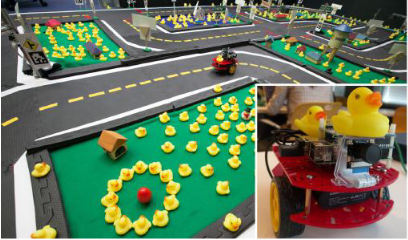Duckietown

People
Funding
MIT
More LinksAbout the Project
As robotics and automation are getting more limelight, it is essential that appropriate teaching methods should be developed so that students can be trained in the different skills relevant to this field. A modern curriculum should should train students in the individual components and the system-level interactions of a robot or self driving vehicle. This poses several challenges as building a fullscale vehicle is very costly and also imposes significant logistical and safety-related problems. Second, the time required to develop such a system including all of the components and infrastructure is significant, and much of it is spent on tasks not directly related to the desired subject matter. This is where this project introduces Duckietown, a platform for autonomy education and research.
Duckietowns are carefully designed to allow a varying scale of difficulty in perception, inference and control tasks that makes the platform usable in a wide range of applications, from undergraduate-level education to research-level problems. Duckietown includes autonomous vehicles called duckiebots which use a Raspberry Pi 2 for computation and a single camera for sensing. These bots are capable of basic line detection as well as more complex behavior such as vision based multi-robot coordination.
The focus of this platform is for an autonomous driving application where a single bot can be used to perform lane following and navigate across the town or multiple bots can be used to also include traffic intersections and coordination. A duckiebot has been built from off-the-shelf components which are replaceable and require minimal assembly time.
Project Demonstrations
Funding & Partners
Related Publications
Duckietown: an Open, Inexpensive and Flexible Platform for Autonomy Education and Research
In Proc. of the IEEE Int. Conf. on Robotics and Automation (ICRA),
2017.